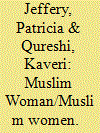|
|
|
Sort Order |
|
|
|
Items / Page
|
|
|
|
|
|
|
| Srl | Item |
| 1 |
ID:
087289


|
|
|
|
|
| Publication |
2009.
|
| Summary/Abstract |
In recent decades, the age of marriage in many minority Muslim communities has risen so that significant numbers of Muslims in these contexts are remaining unmarried into their late 20 s and beyond. As with other communities in Western contexts, Muslim communities have also experienced a rising divorce rate, leading to many more single women. These social and demographic changes, combined with traditional attitudes towards female sexuality and virginity, have led to a rise in the number of women who have either never had a sexual encounter or who no longer have sexual encounters. Cultural discourses surrounding virginity and female celibacy frequently conflate the virtue of refusing sexual encounters outside of marriage with happiness and satisfaction at 'choosing the right path'. However, these discourses negate or downplay women's sexual desires and result in women often feeling trapped into having to perform the 'myth of the happy celibate'. To disrupt this myth is to unleash the potentially destructive power of female sexuality, while to openly challenge it is to risk being positioned as a 'slut'.
|
|
|
|
|
|
|
|
|
|
|
|
|
|
|
|
| 2 |
ID:
131801


|
|
|
|
|
| Publication |
2014.
|
| Summary/Abstract |
Raihana Tyabji is best known in history, not for her writing or even her singing, but as a devotee of Gandhi. Yet in 1924 this at least nominally Muslim woman composed a small book of bhakti devotionalism that has continued to garner popular interest right into the twenty-first century. She gave it the evocative title, The Heart of a Gopi, on the basis that what had been revealed to her was the very 'soul', the inner self, of the gopi and, through that, an understanding of Lord Krishna himself. This paper considers the question of how far this piece of bhakti devotionalism may be read as a kind of personal narrative, an evocation of the self. Does the referencing of an established narrative tradition give the author's feelings and experiences, especially as a Muslim woman devoted to Krishna at a time of increasing religious rigidity and growing communal strife, a kind of validity not achievable otherwise? And, if so, how do we separate out the author's 'self' from the literary conventions-in this case, the gopi tradition-that structure the story? In the tradition of Islamic life-writing, can the gap between the miraculous and the mundane be breached in order to understand the mystical experience charted here as a kind of autobiography? Even from the rationalist's perspective, should not the life of the imagination still be considered part of the life?
|
|
|
|
|
|
|
|
|
|
|
|
|
|
|
|
| 3 |
ID:
185576


|
|
|
|
|
| Summary/Abstract |
Images of the ‘Muslim Woman’ – passive, cloistered, and oppressed – have a long and inglorious history and have often been deployed in wider political debates in South Asia and beyond. The ground realities, however, tell a different story: there is no such person as the ‘Muslim Woman’ and this Special Issue presents papers that highlight the diversity of Muslim women’s lives within South Asia and among Muslim women of South Asian heritage in the diaspora. Muslim women often live in economic and political contexts that are hostile to their wellbeing and their experiences are also shot through with their own intersecting identities – region and residence, class, educational and employment opportunities, marital status, stage in the life course, and so forth. Our contributors focus on different arenas to highlight the diverse complexities faced by Muslim women grappling with the exigencies of daily life: engagements with the legal system in relation to marriage and inheritance; performing ‘claims work’ in order to obtain their entitlements from the state; involvement in income-generating work; and the impact of male outmigration on ‘left-behind’ wives.
|
|
|
|
|
|
|
|
|
|
|
|
|
|
|
|
|
|
|
|
|